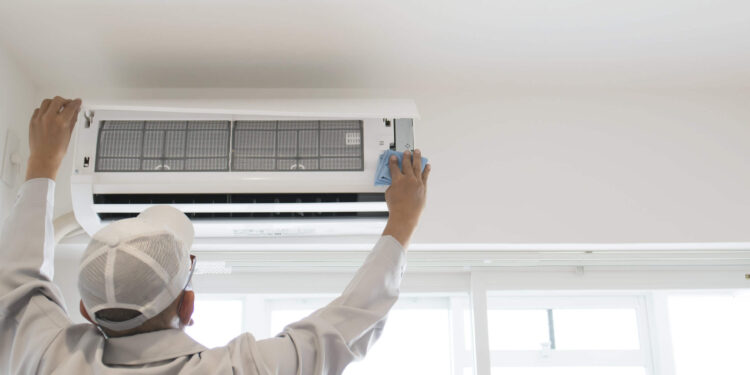8 Ways to Maintain Your AC’s Compressor

An air conditioning compressor is one of the most important components of a residential or commercial system. It’s responsible for compressing and pumping refrigerant throughout the AC unit, which is necessary for cooling your home or office. Without it, your air conditioner won’t be able to reliably cool your space. But compressor failure can be caused by several factors, and professionals at Gustave A. Larson believe that preventative maintenance can help you avoid costly repairs or even replacement.
What are 8 ways to maintain my AC’s compressor?
Here are 8 ways to maintain your air conditioner’s compressor.
1. Check the Refrigerant Level
A low refrigerant level can cause an AC compressor to overheat and fail prematurely. You should have a professional check the refrigerant level at least once a year, although more frequent checkups may be necessary if you live in an area with extreme heat or humidity.
2. Change Filters Regularly
Dirty filters can cause strain on your AC compressor and must be changed regularly according to the manufacturer’s instructions (typically every 3 months). Not only will this help keep your air conditioner running efficiently, but it will also save energy and money on utility bills in the long run.
3. Keep the Outdoor Unit Clear
Make sure that any shrubs, trees, or other obstructions are kept away from the outdoor unit of your air conditioner so that it has plenty of room to breathe and circulate air easily without obstruction.
4. Monitor Temperature Settings
Make sure that you don’t set your thermostat too low as this will put unnecessary strain on your AC compressor. Also, make sure that all windows are closed when using the AC so as not to let in hot outside air which could make it harder for the unit to cool down the space quickly enough without overworking itself.
5. Use Ceiling Fans
Using ceiling fans in conjunction with an air conditioner can help reduce strain on its compressor by making it easier for conditioned air to reach all areas of a room quickly and efficiently without having to run continuously for long periods of time in order to do so. This is especially important during peak summer months when temperatures tend to rise higher than usual both outside and inside. This helps keep indoor temperatures more consistent while still using less energy than if you were just relying on an AC alone – a win-win!
6. Schedule Professional Maintenance
Scheduling regular maintenance appointments with a professional technician will ensure that any small problems with your AC unit are caught early before they become bigger issues later down the line. That’ll save you from potentially expensive repairs or replacements later on down the road!
7. Monitor Power Usage
Keep track of how much electricity your AC is using each month by tracking its energy usage via a smart meter or other device connected directly to it. This will alert you if there is something wrong with either the unit itself or if it’s the compressor that needs attention.
8. Upgrade When Necessary
If possible, upgrade your old model when necessary. Newer models typically come equipped with better features that help reduce energy consumption while still providing reliable cooling power throughout the hot summer months. The cost upfront may seem high but remember that investing in newer technology now means lower repair costs down the line, as well as potential savings on monthly utility bills due to increased efficiency ratings.
Final note
Keeping up with routine maintenance tasks like changing filters regularly, monitoring temperature settings and power usage, etc., can go a long way towards avoiding costly repairs due to premature AC compressor failure down the line. By keeping these tips in mind and investing in newer technology whenever possible, you’ll be able to stay cool (and warm) all year round without breaking the bank along the way.





